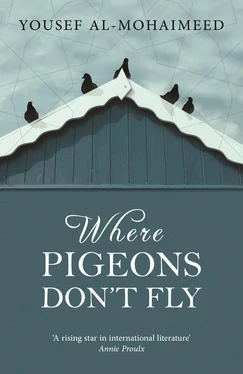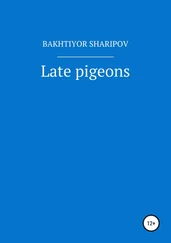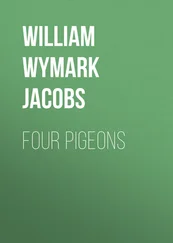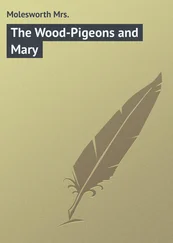And so it was that in a few short years he became the owner of seventeen agarwood outlets in Riyadh. His Abu Ayoub Agarwood and Eastern Perfumes chain enjoyed an irresistible appeal and credibility amongst the public. The Bangladeshi guard no longer manned the shop on his own, but was assisted by a large number of Indonesian employees with long, light beards whose individual hairs hung down separately, and gleaming white ghatras on their heads, the sort whose toothsticks only left their mouths when they slept.
— 13 —
OCCASIONALLY, SOMEONE WOULD ASK why Abu Ayoub was so keen on marrying his brother’s widow. Was it out of spite? Was it because all his deceased brother had salvaged from the wreck of this world was a beautiful wife whom he loved, leaving Abu Ayoub dreaming of adding her to his possessions, like the hundredth camel in the story of the two brothers, one of whom owned ninety-nine of the beasts but could not rest until he had taken possession of his brother’s only camel to make a round one hundred?
One summer evening Fahd and Lulua clapped for joy and shouted when Abu Essam and his wife knocked on their door, bringing with them gifts from Amman and spreading laughter through the sad house. But the laughter died away when the two young ones discovered that their grandparents had come to tell them that one day they would grow up, marry and have homes and children of their own to distract them from their mother, that this was life, and it was their mother’s right to look to her own interests. So it was that Abu Ayoub slipped in, a wolf dressed as a pussycat, who later tried to win Fahd over by buying him a new car.
Just a month later and Abu Ayoub was ready to usher angels into the home that his brother — God rest his soul — had made a dwelling place for devils and infidel demons. By degrees, life started to change: the still-grieving Soha began setting the dial on her kitchen radio to play the Holy Qur’an all day long, and then the cassettes of Fairuz, Umm Kulthoum, Khaled Abdel Rahman and Ahlam vanished to be replaced by taped sermons. In one a sheikh screeched away as he recounted the terrors of the Day of Resurrection and the sins committed by the heedless, such as giving an ear to slander, gossip and song, coveting that which God had declared forbidden, adultery, sodomy, prostitution and filth. He spoke of the righteous path: hotter than burning coals, more slender than a hair, sharper than a knife-edge, more elusive than a fox, with Paradise at one end and hellfire beneath it and no way forward but along its back. Another sheikh spoke of death, when they place you in the grave and the two angels, Munkir and Nakeer, come to judge you; then he wept and wept and with him wept Soha and little Lulua.
A few months later and the uncle started urging Fahd to enrol at the College of Sharia Law, promising that he would come top of his class and get a job as a judge or court clerk. Despite the overpowering influence of his uncle, Fahd never even considered it. His loathing of the man had grown after he took down his father’s portrait from the living room wall. Fahd took the picture to his bedroom where he was now confined, when in his father’s time the whole house had been his. He hung the picture facing his bed, but his uncle surprised him in the room one day and screamed, ‘You’re in need of some re-education. Pictures are not to be glorified, don’t you understand?’
His uncle took the picture down and flung it to the ground. ‘I don’t want to see any pictures in this house after today. Pictures are forbidden. You just don’t get it. Angels won’t enter a house where there are pictures. God protect me from you!’
He went out and Fahd froze, the fingers clutching his ruler and open biology textbook suddenly numb. He got to his feet, the needle stitching its thread through his chest. He lifted up his father’s smiling portrait, the one taken at Studio Zamani in Thalatheen Street with its painted backdrop of books on a shelf. Sobbing, he kissed it and then hid it behind his clothes in the wardrobe. When he went to bed at night he would lock his door, take it out and sit talking to his father, reproaching him:
‘Why did you betray me, Father? You had no right to run off and leave me to face life on my own. You had no right letting this person meddle with my life. Have you noticed that the only thing left of you in your own house is inside my wardrobe? All of this because of your brother, with his belly, his beard and his stink like the smell of the dead. Sometimes I think that he really is dead. He smells like a corpse as he climbs the stairs to the house. I don’t know, I just smell dead men climbing the stairs. I even feel that you’re alive, sometimes, that behind my clothes you’re more alive than him.’
Nor did Abu Ayoub find it easy to accept Saeed, the family friend, coming into the house. This young man, raised by Suleiman as a favour to his fellow inmate Mushabbab, who had spent happy days as one of the family and often travelled with them to Sharqiya and Ta’if, was now banned from their home.
‘I’m not worried about your boy other than from that Southerner,’ Abu Ayoub shouted to the back of Soha’s head one day as she stood silently before the stove making his bitter coffee. ‘His father was a terrorist, one of Juhayman’s group, and his family are a bunch of degenerate Zero-Sevens. Come into this house? Not a chance. I’ve bumped into him in the majlis a few times wearing a T-shirt and underwear and nothing else.’
One evening, when the uncle was with his first wife, Umm Yasser, Saeed called Fahd up to invite him out to Yamama College.
‘We’ll catch a play and get a break from studying.’
Fahd agreed and told him that he would wait at Tareeqati Café, to avoid the possibility of his uncle surprising him outside the door as he got into Saeed’s car. He had no desire to bring the man’s rage and ranting down on his mother. When it was time for the sunset prayer he put his shimagh over his shoulder, told her he was going out and hurried off.
Saeed was sitting in his car outside the café. Before getting in Fahd motioned with his hand to say that he would fetch some coffee. Saeed nodded. When Fahd pushed the glass door he found that it was locked. He peered inside where the dim lights glowed but saw no one. He rapped his knuckle against the glass. Saeed got his attention with a soft honk of the horn and held his hand in front of his mouth like a megaphone, indicating that it was a prayer time. Inside the café a little sign dangled down above the door: Closed for Prayer .
Fahd got in and Saeed told him that he had been to the college the evening before and there were cafés and restaurants by the main entrance. They set off towards Qaseem Road and as they approached Quwa al-Amn Bridge, Saeed moved to the right lane and turned left, heading back to Riyadh on the service road. At the corner of the college’s outer wall he turned right and they passed through the northern gate, finding a parking space some distance from the main building. It was still early but they walked until they had almost crossed the courtyard in front of the entrance.
‘Some coffee or tea?’ Saeed asked.
‘Ummm … There’s a poetry evening that should be wrapping up now. Let’s go and watch some.’
‘Fahd, I don’t feel like modern poetry, and anyway I don’t understand any of it.’
‘Fine, we’ll just take a look. It’s still half an hour till the play. Enough time to get a tea or coffee. What do you say?’
‘OK.’
They entered the half-full auditorium, found a place in the centre and quietly sat down. In front of them were four bearded young men. One had long hair that flopped down over his shoulders despite being covered by a shimagh , while in the front row the other three sat wearing brown mashlahs .
Читать дальше












